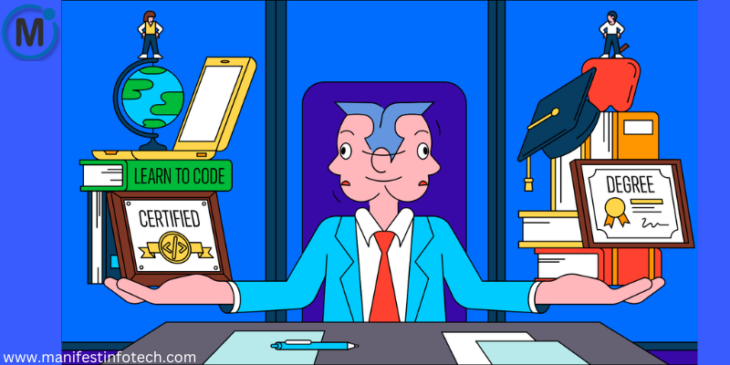
In today’s fast-evolving job market, traditional hiring practices are making way for skill-based hiring, emphasizing an individual’s capabilities over just degrees and certifications. With the demand for AI, ML, data analytics, and cloud computing roles expected to grow by 30-35%, businesses are shifting their focus toward skills and continuous learning to stay ahead in the competitive landscape.
The Rise of Skill-Based Hiring
Employers are increasingly prioritizing candidates who possess practical experience and demonstrated expertise over those with formal academic backgrounds. In tech-centric industries, proficiency in programming languages, cloud platforms, and machine learning models holds more value than just a diploma.
Organizations like Google and IBM have redefined their hiring policies, removing mandatory degree requirements for various tech roles. Instead, they assess candidates through coding challenges, project-based tests, and hands-on evaluations, ensuring they hire professionals who can contribute immediately.
The Growing Importance of Upskilling
To keep up with industry trends, professionals must continuously update their knowledge. Upskilling has become a necessity rather than a choice, with many companies investing in employee training programs to bridge skill gaps. Online platforms like Coursera, Udacity, and LinkedIn Learning offer specialized courses in AI, ML, data analytics, and cloud computing, enabling individuals to enhance their expertise from anywhere.
Benefits of Skill-Based Hiring & Upskilling
Better Job Matches: Employers can find candidates with precise skill sets, leading to improved job performance and productivity.
Increased Career Opportunities: Professionals with up-to-date skills stand out in the job market and secure higher-paying roles.
Faster Adaptability: Businesses benefit from a workforce that can quickly adapt to technological advancements.
Cost Efficiency: Training existing employees is often more cost-effective than hiring new talent, reducing turnover and recruitment expenses.
How Businesses Can Implement Skill-Based Hiring
Focus on Practical Assessments: Replace traditional resumes with real-world tasks and coding tests.
Leverage AI in Recruitment: Use AI-powered tools to evaluate skills through simulations and automated interviews.
Encourage Continuous Learning: Offer in-house training programs or reimburse employees for online courses.
Build a Skills-First Culture: Shift the mindset from credentials to capabilities, promoting a meritocratic work environment.
Final Thoughts
As the job market continues to evolve, skill-based hiring and upskilling will define the future of employment. Companies that embrace this shift will build stronger teams, while professionals who commit to lifelong learning will unlock better career prospects.
If you are looking for any services related to Website Development, App Development, Digital Marketing and SEO, just email us at nchouksey@manifestinfotech.com or Skype id: live:76bad32bff24d30d
𝐅𝐨𝐥𝐥𝐨𝐰 𝐔𝐬:
𝐋𝐢𝐧𝐤𝐞𝐝𝐢𝐧: linkedin.com/company/manifestinfotech
𝐅𝐚𝐜𝐞𝐛𝐨𝐨𝐤: facebook.com/manifestinfotech/
𝐈𝐧𝐬𝐭𝐚𝐠𝐫𝐚𝐦: instagram.com/manifestinfotech/
𝐓𝐰𝐢𝐭𝐭𝐞𝐫: twitter.com/Manifest_info
Stay ahead in the digital era by investing in skills and innovation!
SkillBasedHiring #Upskilling #TechCareers #AI #MachineLearning #DataAnalytics #CloudComputing #CareerGrowth #FutureOfWork #DigitalMarketing #ManifestInfotech